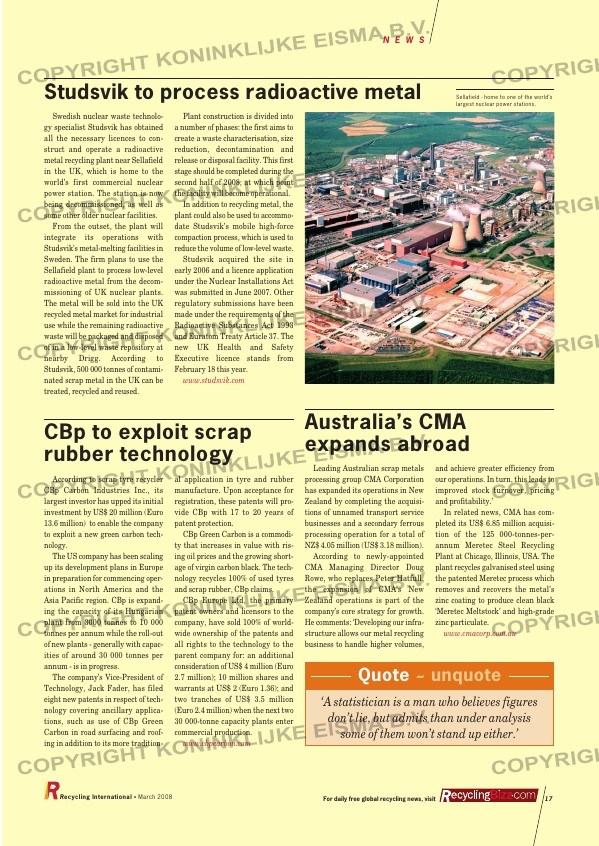Page 17 from: March 2008

N E W S
Recycling International • March 2008 17For daily free global recycling news, visit
According to scrap tyre recycler
CBp Carbon Industries Inc., its
largest investor has upped its initial
investment by US$ 20 million (Euro
13.6 million) to enable the company
to exploit a new green carbon tech-
nology.
The US company has been scaling
up its development plans in Europe
in preparation for commencing oper-
ations in North America and the
Asia Pacific region. CBp is expand-
ing the capacity of its Hungarian
plant from 3000 tonnes to 10 000
tonnes per annum while the roll-out
of new plants – generally with capac-
ities of around 30 000 tonnes per
annum – is in progress.
The company’s Vice-President of
Technology, Jack Fader, has filed
eight new patents in respect of tech-
nology covering ancillary applica-
tions, such as use of CBp Green
Carbon in road surfacing and roof-
ing in addition to its more tradition-
al application in tyre and rubber
manufacture. Upon acceptance for
registration, these patents will pro-
vide CBp with 17 to 20 years of
patent protection.
CBp Green Carbon is a commodi-
ty that increases in value with ris-
ing oil prices and the growing short-
age of virgin carbon black. The tech-
nology recycles 100% of used tyres
and scrap rubber, CBp claims.
CBp Europe Ltd, the primary
patent owners and licensors to the
company, have sold 100% of world-
wide ownership of the patents and
all rights to the technology to the
parent company for: an additional
consideration of US$ 4 million (Euro
2.7 million); 10 million shares and
warrants at US$ 2 (Euro 1.36); and
two tranches of US$ 3.5 million
(Euro 2.4 million) when the next two
30 000-tonne capacity plants enter
commercial production.
www.cbpcarbon.com
Studsvik to process radioactive metal
Swedish nuclear waste technolo-
gy specialist Studsvik has obtained
all the necessary licences to con-
struct and operate a radioactive
metal recycling plant near Sellafield
in the UK, which is home to the
world’s first commercial nuclear
power station. The station is now
being decommissioned, as well as
some other older nuclear facilities.
From the outset, the plant will
integrate its operations with
Studsvik’s metal-melting facilities in
Sweden. The firm plans to use the
Sellafield plant to process low-level
radioactive metal from the decom-
missioning of UK nuclear plants.
The metal will be sold into the UK
recycled metal market for industrial
use while the remaining radioactive
waste will be packaged and disposed
of in a low-level waste repository at
nearby Drigg. According to
Studsvik, 500 000 tonnes of contami-
nated scrap metal in the UK can be
treated, recycled and reused.
Plant construction is divided into
a number of phases: the first aims to
create a waste characterisation, size
reduction, decontamination and
release or disposal facility. This first
stage should be completed during the
second half of 2008, at which point
the facility will become operational.
In addition to recycling metal, the
plant could also be used to accommo-
date Studsvik’s mobile high-force
compaction process, which is used to
reduce the volume of low-level waste.
Studsvik acquired the site in
early 2006 and a licence application
under the Nuclear Installations Act
was submitted in June 2007. Other
regulatory submissions have been
made under the requirements of the
Radioactive Substances Act 1993
and Euratom Treaty Article 37. The
new UK Health and Safety
Executive licence stands from
February 18 this year.
www.studsvik.com
Leading Australian scrap metals
processing group CMA Corporation
has expanded its operations in New
Zealand by completing the acquisi-
tions of unnamed transport service
businesses and a secondary ferrous
processing operation for a total of
NZ$ 4.05 million (US$ 3.18 million).
According to newly-appointed
CMA Managing Director Doug
Rowe, who replaces Peter Hatfull,
the expansion of CMA’s New
Zealand operations is part of the
company’s core strategy for growth.
He comments: ‘Developing our infra-
structure allows our metal recycling
business to handle higher volumes,
and achieve greater efficiency from
our operations. In turn, this leads to
improved stock turnover, pricing
and profitability.’
In related news, CMA has com-
pleted its US$ 6.85 million acquisi-
tion of the 125 000-tonnes-per-
annum Meretec Steel Recycling
Plant at Chicago, Illinois, USA. The
plant recycles galvanised steel using
the patented Meretec process which
removes and recovers the metal’s
zinc coating to produce clean black
‘Meretec Meltstock’ and high-grade
zinc particulate.
www.cmacorp.com.au
‘A statistician is a man who believes figures
don’t lie, but admits than under analysis
some of them won’t stand up either.’
Quote ~ unquote
Sellafield – home to one of the world’s
largest nuclear power stations.
CBp to exploit scrap
rubber technology
Australia’s CMA
expands abroad
RI_018 NEWS:Opmaak 1 28-02-2008 11:45 Pagina 17



